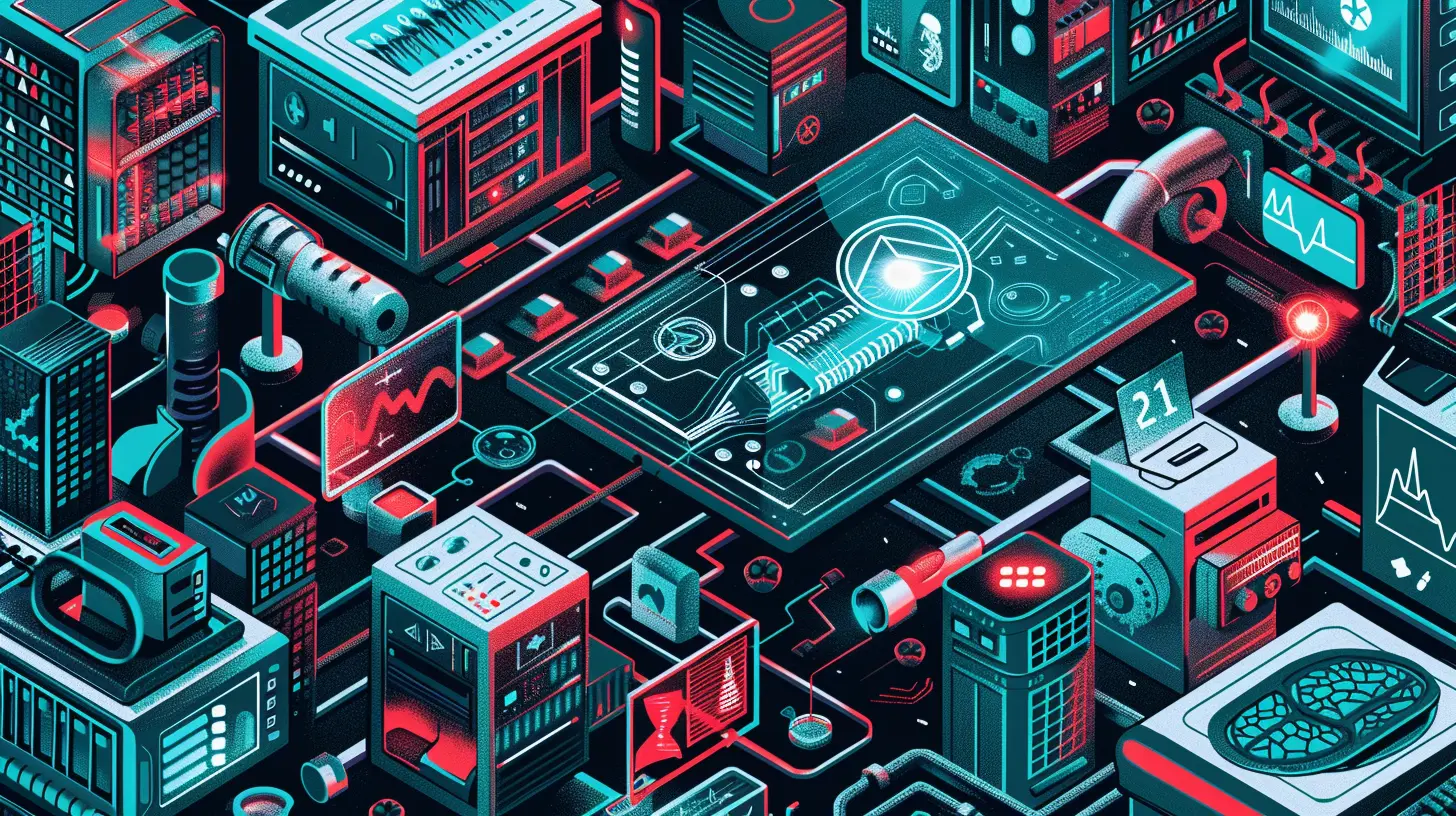Ethical Challenges in AI-Powered Healthcare
29 March 2025
Artificial Intelligence (AI) is changing the way we live, work, and play — and nowhere is this more apparent than in healthcare. From diagnosing diseases to personalizing treatment plans, AI is making healthcare smarter, faster, and, in many cases, more accessible. But hold on a minute. While AI in healthcare is undeniably exciting, it also comes with a suitcase full of ethical challenges that we need to unpack. After all, we’re talking about a technology that deals with people’s lives, and we can’t ignore the potential problems hiding in the shadows.
So, let's talk about the ethical implications of AI in healthcare. From patient privacy to bias in algorithms, there’s a lot to dive into. Ready? Let’s get started.

The Promise of AI in Healthcare: Why All the Hype?
Before we jump into the ethical deep end, let’s take a moment to appreciate why AI in healthcare is such a big deal. AI has the potential to revolutionize the way healthcare is delivered. Imagine a world where algorithms can identify diseases faster than doctors, where personalized treatments are created based on your unique genetic makeup, and where routine tasks like scheduling appointments or managing health records are automated. Sounds amazing, right?AI can process vast amounts of data in the blink of an eye. It can analyze patterns and make predictions that would take humans years to figure out. In short, AI can help healthcare professionals make better decisions, improve patient outcomes, and even reduce costs. But as with any great power, it comes with great responsibility — and that’s where the ethical challenges come in.

Privacy Concerns: Who's Watching Your Data?
Let’s face it, healthcare data is some of the most sensitive information out there. We’re talking about your medical history, genetic information, even your mental health records. Now imagine that kind of data being fed into an AI system. If that doesn’t give you a slight pause, it probably should.One of the main ethical concerns in AI-powered healthcare is privacy. AI systems require a massive amount of data to function properly. This data often includes sensitive patient information. While most AI systems use anonymized data, there’s always a risk that it could be de-anonymized. Worse yet, what if this data is hacked or leaked?
In a world where data breaches seem to happen every other day, this is a legitimate concern. If your healthcare data falls into the wrong hands, it could be used for identity theft, sold to third parties, or worse. It’s a bit like handing over the keys to your house and hoping no one makes a copy.
The Dilemma of Consent
And then there’s the issue of consent. How do patients give informed consent for their data to be used in AI systems? Do they really understand what they’re agreeing to when they sign that consent form? It’s one thing to agree to share your data with a human doctor, but sharing it with a machine? That’s a whole different ball game.There’s also the sticky issue of secondary use. If a healthcare provider collects your data for one purpose, can they use it for something else down the line? The lines can get blurry, and patients may not always be aware of how their data is being used.

Bias in Algorithms: Can AI Be Fair?
We like to think of AI as being neutral, but here’s the truth: AI is only as unbiased as the data it’s trained on. If the data used to train an AI system is biased, the AI will be biased too. And in healthcare, that’s a serious problem.For example, if an AI system is trained primarily on data from white patients, it may not perform as well for patients of other ethnicities. This can lead to misdiagnoses or unequal treatment. The problem is, bias in healthcare isn’t new — but AI has the potential to amplify it.
Think of it like a snowball rolling down a hill. A little bias at the top can turn into a much bigger problem by the time it reaches the bottom. In a healthcare setting, that can mean life-or-death consequences.
The Challenge of Representation
One of the biggest challenges in AI is ensuring that the data used to train these systems is representative. If certain groups of people are underrepresented in the data, they may not benefit from AI in the same way that others do. This is particularly concerning for marginalized communities, who may already face disparities in healthcare access and treatment.So how do we fix this? It’s not easy. It requires a concerted effort to collect diverse data and to constantly monitor AI systems for signs of bias. But even then, it’s an uphill battle.

Accountability: Who's to Blame When AI Makes a Mistake?
AI can do a lot of things, but it’s not perfect. Mistakes happen. The question is, who’s responsible when they do?Let’s say an AI system misdiagnoses a patient, leading to the wrong treatment. Who’s at fault? The doctor who relied on the AI? The developer who created the algorithm? Or maybe the hospital that implemented the system?
Accountability is one of the trickiest ethical challenges in AI-powered healthcare. When something goes wrong, it’s not always clear who should be held responsible. This is particularly problematic because AI systems often operate as “black boxes.” In other words, they make decisions in ways that even their creators may not fully understand.
The Black Box Problem
The black box problem is a big deal. With traditional healthcare, doctors can explain why they made a particular decision. With AI, it’s not always that simple. AI systems use complex algorithms that are difficult — if not impossible — for humans to interpret. This lack of transparency can make it hard to trust AI, especially when lives are on the line.To build trust in AI-powered healthcare, there needs to be a way to ensure accountability when things go wrong. Whether that means creating more transparent algorithms, implementing stricter regulations, or ensuring that human oversight is always part of the process, it’s clear that something needs to change.
The Doctor-Patient Relationship: Can AI Replace Human Care?
Now, let’s talk about something that’s a bit more philosophical: the doctor-patient relationship. Healthcare has always been, at its core, about human connection. It’s about trust, empathy, and understanding. But what happens when algorithms start playing a bigger role in patient care?There’s a growing concern that AI could erode the doctor-patient relationship. If doctors rely too heavily on AI, they may spend less time interacting with their patients. This could lead to a more impersonal healthcare experience, where patients feel like they’re being treated by machines rather than people.
The Importance of Human Touch
No matter how advanced AI becomes, it can’t replicate the human touch. Machines can analyze data and predict outcomes, but they can’t provide the kind of emotional support that patients often need. For many people, knowing that their doctor cares about them on a personal level is just as important as the treatment they receive.While AI can certainly assist doctors, it should never replace the human element of healthcare. Striking the right balance between technology and human care is essential for maintaining the trust and rapport that are so crucial in the doctor-patient relationship.
Ethical Use of AI: Finding a Balance
So, where does this leave us? AI has the potential to do incredible things in healthcare, but it also raises serious ethical challenges. The key is to find a balance. We need to embrace the benefits of AI while also addressing its risks.This means putting safeguards in place to protect patient privacy, ensuring that AI systems are fair and unbiased, and holding developers and healthcare providers accountable when things go wrong. It also means recognizing that AI is a tool — not a replacement for human care.
The Role of Regulations
One way to address these ethical challenges is through regulation. Governments and healthcare organizations need to develop clear guidelines for the use of AI in healthcare. This includes setting standards for data privacy, ensuring transparency in AI systems, and establishing protocols for accountability.But regulations alone aren’t enough. The healthcare industry also needs to foster a culture of ethical responsibility. This means encouraging healthcare providers to critically evaluate AI systems, to question their outputs, and to always prioritize the well-being of their patients.
Conclusion: Navigating the Future of AI in Healthcare
AI-powered healthcare is here to stay, and it’s only going to become more prevalent in the coming years. The potential benefits are enormous, but we can’t ignore the ethical challenges that come with it. From privacy concerns to algorithmic bias, accountability issues, and the future of the doctor-patient relationship, there’s a lot to consider.But here’s the good news: we have the power to shape the future of AI in healthcare. By addressing these ethical challenges head-on, we can ensure that AI is used in a way that enhances — rather than diminishes — patient care. After all, technology should serve people, not the other way around.
all images in this post were generated using AI tools
Category:
Ai EthicsAuthor:

Ugo Coleman
Discussion
rate this article
8 comments
Tempra Perez
AI in healthcare presents ethical dilemmas that require careful consideration and collaborative solutions from stakeholders.
May 15, 2025 at 6:25 PM

Ugo Coleman
Thank you for your insightful comment! Indeed, addressing ethical dilemmas in AI healthcare requires collaboration among all stakeholders to ensure responsible and equitable solutions.
Juno Garcia
Navigating ethical dilemmas in AI healthcare requires a balance between innovation and compassion, ensuring technology serves humanity's best interests.
April 27, 2025 at 10:33 AM

Ugo Coleman
Absolutely, striking that balance is crucial to ensure AI enhances patient care while upholding ethical standards. Thank you for your insight!
Lily Green
Critical issues demand urgent attention.
April 10, 2025 at 12:35 PM

Ugo Coleman
Absolutely, addressing these ethical challenges is crucial for ensuring safe and equitable AI integration in healthcare.
Zaylee O'Neal
Insightful article! Addressing ethics is crucial for AI in healthcare.
April 8, 2025 at 3:19 AM

Ugo Coleman
Thank you! I'm glad you found it insightful. Addressing ethics is indeed vital for the responsible use of AI in healthcare.
Poppy McClellan
AI: Saving lives or just rebooting ethics?
April 6, 2025 at 11:46 AM

Ugo Coleman
AI in healthcare has the potential to save lives, but it also necessitates a critical reevaluation of our ethical frameworks to ensure responsible implementation and equitable outcomes.
Zorina Castillo
Addressing biases and privacy is crucial for ethical AI.
April 6, 2025 at 4:52 AM

Ugo Coleman
Absolutely, addressing biases and ensuring privacy are fundamental to building trust and effectiveness in AI-powered healthcare.
Carson Jackson
This article highlights crucial ethical dilemmas in AI-driven healthcare, such as data privacy, algorithmic bias, and accountability. Addressing these challenges is essential to ensure patient safety and trust. A multi-stakeholder approach, involving technologists and ethicists, can pave the way for responsible AI integration in healthcare systems.
April 2, 2025 at 3:03 AM

Ugo Coleman
Thank you for your insightful comment! I completely agree that addressing these ethical dilemmas through collaboration among stakeholders is vital for fostering trust and safety in AI-driven healthcare.
Juno Pope
What an enlightening read! The intersection of technology and healthcare is such an exciting space. Addressing ethical challenges is crucial for building trust and ensuring patient well-being. I’m optimistic about the potential for AI to transform healthcare positively while navigating these important issues!
April 1, 2025 at 6:56 PM

Ugo Coleman
Thank you for your thoughtful comment! I completely agree—addressing ethical challenges is essential for harnessing AI's potential in healthcare effectively.
MORE POSTS

How Biotech Innovations Are Contributing to Environmental Sustainability

The Best Mobile Photography Tips to Capture Stunning Shots

Exploring the Potential of Solar-Powered Electric Vehicles

The Ethics of AI in Emotional Manipulation: Can Machines Manipulate Us?

How Green Tech is Reducing the Carbon Footprint of the Music Industry

How Drone Technology Is Being Used in Telecommunications